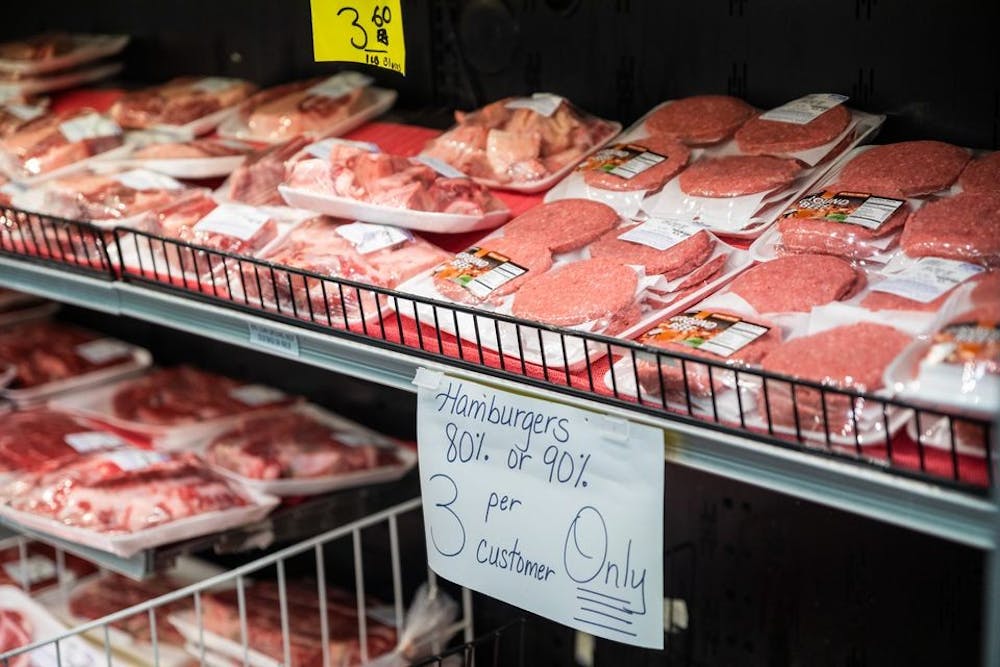One of the many parts of American life upended by the COVID-19 pandemic is meat consumption. Large meat-packing facilities are the perfect locations for disease to spread. While some consumers are stocking up on meat amid fears of a shortage, others who face financial hardship or prefer less perishable options have been purchasing less meat and transitioning to meatless or lighter meat diets.
There's considerable evidence that too much meat consumption is bad for the environment, our bodies, animals and the employees of large meat-packing facilities. The logistical, sanitary and ethical issues with meat consumption are nothing new, but the current moment provides an opportunity to reflect.
Meat-processing plants are major COVID-19 vectors, putting workers and consumers at risk of contracting the disease. In about half of all U.S. counties with the highest per capita infection rates, the outbreak can be traced back to a meat-processing plant.
As with so many global and national problems, COVID-19 has shed a light on the health and safety hazards that run rampant in commercial meat processing, from dangerous machinery to hazardous chemicals.
Workers are routinely penalized for taking time off when they are sick or injured. Since the beginning of the pandemic, hundreds of workers and inspectors from the United States Department of Agriculture have gotten sick and, in some cases, died, largely due to the inability of workers in such plants to practice social distancing. At just one Tyson plant in Indiana, for example, about 900 workers tested positive for COVID-19.
Livestock, cattle specifically, is a major contributor to greenhouse gas emissions. Reducing the amount of meat and dairy you consume, or eliminating it altogether, is the “single biggest way” to reduce your carbon footprint.
Meat production as it exists today is horrible for the environment, and it isn’t great for our bodies. Red meat in particular raises the risk of heart disease, cancer and diabetes, and there are no clear benefits compared to other sources of protein.
Why is it so hard to reduce the amount of meat we eat, given all of this? There are many cultural factors that make our relationship with meat so complex. In some parts of the United States, especially in rural areas, meat is inseparable from patriotism and national identity.
It's commonly a trait of toxic and fragile masculinity, with excessive consumption of meat, particularly red meat, understood as a component of being a “real” man. In all forms of media, from movies to commercials, meat is manly. One of the most popular sloppy Joe mixes in existence is literally called Manwich.
Some reasons are more straightforward. Human beings are creatures of habit, and some people don’t have the energy or inclination to overhaul the way their family eats and adjust to a new diet. And meat is, admittedly, delicious.
In short, not everyone is prepared to transition to a completely meatless diet, myself included. However, reducing meat consumption has benefits on every level: ethical, physical and financial.
Because eating less meat saves money, you can purchase your meat locally, which is usually more expensive than buying your meat from the supermarket but also more ethical, healthier and supportive of small and local businesses. Ethical butchery is rapidly growing, and many of the butchers that describe themselves this way used to be vegans or vegetarians. In short, locally sourced diets are ethical diets.
COVID-19 has led to changes and reevaluations in many parts of our lives. Perhaps it will lead American consumers to see meat as a treat rather than as a staple, and we will all be healthier in the long run if that happens.
Kaitlyn Radde (she/her) is a rising junior studying political science. She plans to pursue a career in public interest law.






